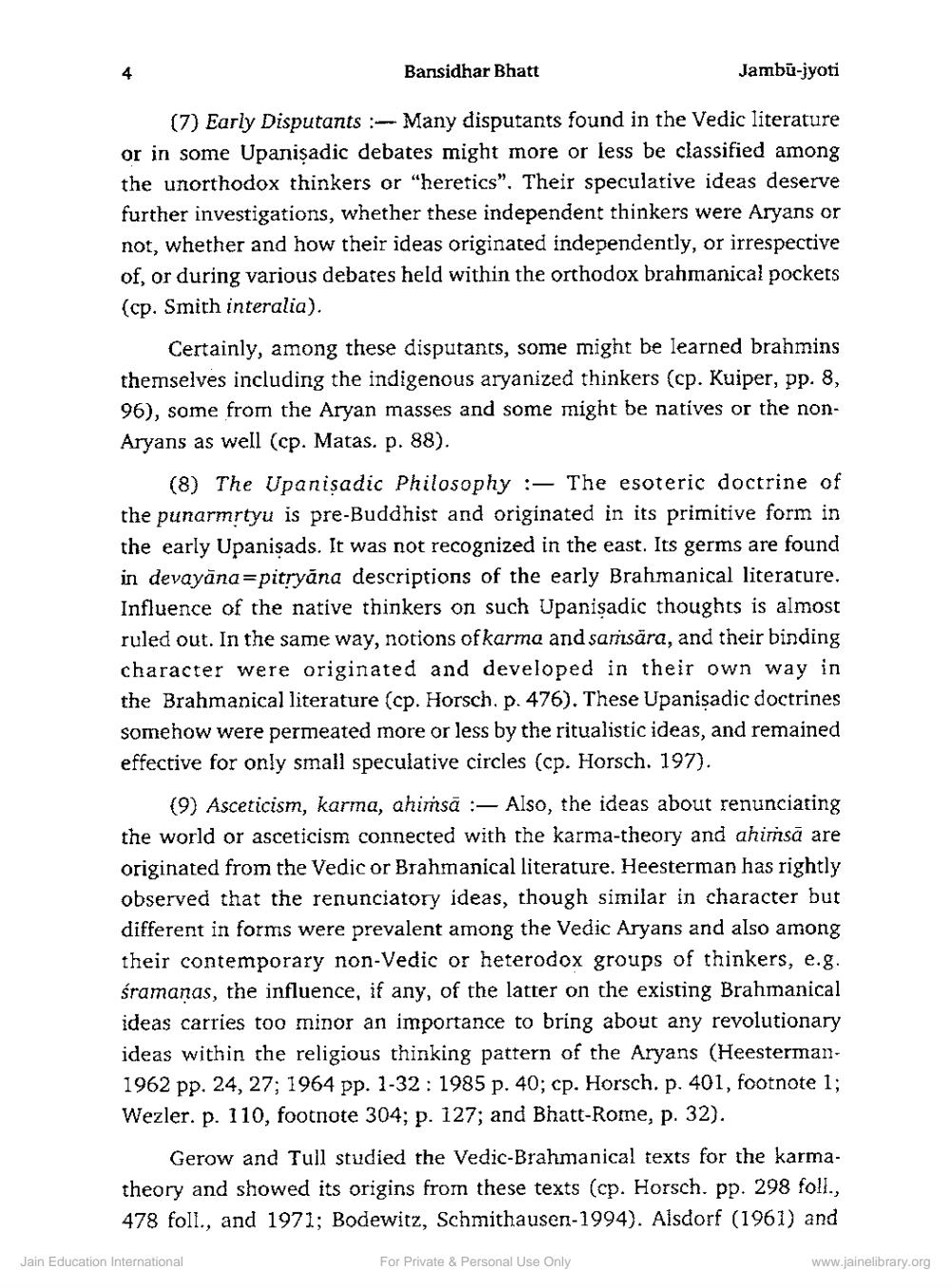Book Title: Jainism vis a vis Brahmanism Author(s): Bansidhar Bhatt Publisher: Z_Nirgranth_Aetihasik_Lekh_Samucchay_Part_1_002105.pdf and Nirgranth_Aetihasik_Lekh_Samucchay_Part_2 View full book textPage 4
________________ Bansidhar Bhatt Jambu-jyoti (7) Early Disputants :- Many disputants found in the Vedic literature or in some Upanişadic debates might more or less be classified among the unorthodox thinkers or "heretics". Their speculative ideas deserve further investigations, whether these independent thinkers were Aryans or not, whether and how their ideas originated independently, or irrespective of, or during various debates held within the orthodox brahmanical pockets (cp. Smith interalia). Certainly, among these disputants, some might be learned brahmins themselves including the indigenous aryanized thinkers (cp. Kuiper, pp. 8, 96), some from the Aryan masses and some might be natives or the nonAryans as well (cp. Matas. p. 88). (8) The Upanisadic Philosophy :- The esoteric doctrine of the punarmrtyu is pre-Buddhist and originated in its primitive form in the early Upanisads. It was not recognized in the east. Its germs are found in devayāna=pitryāna descriptions of the early Brahmanical literature. Influence of the native thinkers on such Upanisadic thoughts is almost ruled out. In the same way, notions of karma and samsära, and their binding character were originated and developed in their own way in the Brahmanical literature (cp. Horsch. p. 476). These Upanisadic doctrines somehow were permeated more or less by the ritualistic ideas, and remained effective for only small speculative circles (cp. Horsch. 197). (9) Asceticism, karma, ahimsā :- Also, the ideas about renunciating the world or asceticism connected with the karma-theory and ahimsā are originated from the Vedic or Brahmanical literature. Heesterman has rightly observed that the renunciatory ideas, though similar in character but different in forms were prevalent among the Vedic Aryans and also among their contemporary non-Vedic or heterodox groups of thinkers, e.g. śramanas, the influence, if any, of the latter on the existing Brahmanical ideas carries too minor an importance to bring about any revolutionary ideas within the religious thinking pattern of the Aryans (Heesterman1962 pp. 24, 27; 1964 pp. 1-32: 1985 p. 40; cp. Horsch. p. 401, footnote 1; Wezler. p. 110, footnote 304; p. 127; and Bhatt-Rome, p. 32). Gerow and Tull studied the Vedic-Brahmanical texts for the karmatheory and showed its origins from these texts (cp. Horsch. pp. 298 foll., 478 foll., and 1971; Bodewitz, Schmithausen-1994). Alsdorf (1961) and Jain Education International For Private & Personal Use Only www.jainelibrary.orgPage Navigation
1 2 3 4 5 6 7 8 9 10 11 12 13 14 15 16 17 18 19 20 21 22 23 24 25 26 27 28 29 30 31 32 33 34 35 36 37 38 39 40 41 42 ... 47
